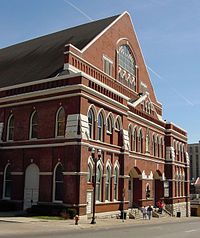[contextly_auto_sidebar id=”Qwm7a4AXHZhLoHI5Q02SruYLg3cIgNWX”]
ONE of the most pressing issues for culture-makers (and fellow travelers, like your humble blogger) is rapid gentrification. Often driven by the arrival or artists and musicians to a neighborhood or city, winner-take-all capitalism often means that investors and Trump-like developers arrive soon after and squeeze out the creative class and the middle class very soon after.
Recently I spoke on the radio about this process in Los Angeles; it’s taken place in London, New York, the Bay Area (where it has shuttered rock and electronica clubs) and elsewhere.
Nashville is decades into being an important music town and a few years into being a very “hot,” GQ-approved city, and these two tendencies seem to now be at war. The near-death of local legend Studio A — nearly turned into a condo complex — has provoked a “long-simmering debate about gentrification, local culture and the fast-changing face of a city that, until the last decade or so, seemed frozen in time.”
That’s according to Nashville Scene staffer Steve Haruch, who writes in the New York Times:
Neighborhoods close to downtown once drew teachers, writers and musicians with well-built, well-priced Craftsman homes. But with the influx of wealth has come a new kind of buyer, often an investor offering cash well above asking price. A house that went for $40,000 a decade ago might now go for 15 times that amount.
Even worse, for many of these new gentrifiers, the old Craftsman homes are just too small, so developers have been buying up these small houses, then demolishing and replacing them with much larger ones.
Leonard Cohen, who recorded two of his best albums in Nashville, once sang, “We are ugly, but we have the music.” After every block is lined with towering fake bungalows, after every dive bar is either plowed under or rebranded with artisanal cocktails, after every plank of reclaimed barn wood has been upcycled to provide ambience for boutique comfort food that only the already-comfortable can afford, after every bit of character has been scrubbed out of the alleys and arcades, we may wonder if Music City still has the music after all, and ponder what we lost when we gazed into our gleaming new towers and fell in love with the reflection.
In every city, it happens a bit differently. But when we organize our economic system to leave creative people out, destabilize the middle class, and to bring enormous wealth to a tiny minority, this kind of thing becomes nearly inevitable.


visited nashville in august after years away. stunned by the changes. the old music district has been reduced to a gawker’s tourist walk surrounded by megaplexes of chrome and glass. it’s ugly and cold. very sad.
Bashing Nashville’s development has become its latest fad. As a resident who’s seen the city thrive and blossom since I arrived in ’96, I just can’t join the complainers. There are twice as many music venues, way better food and a national caliber craft brew scene. You can see the world’s best guitarists play for fun with their favorite musical collaborators in easy going places on Sunday afternoons. They saved an Art Deco post office by making it an arts center and built classical-style library and concert hall. There’s development stress sure, but I wish people would put it in perspective. From the critics I seem to only learn that glass=bad.
Frankly, the Caliyorkers flooded the place, turning it into a pretentious facsimile of their native wastelands (as well as bringing their laws and ideals). Nashville was awesome because it was a city without being a la me east/west coast blue city that cost a fortune to live in. Now it is just Denver lite, which is Seattle lite, which is LA lite, which is Chicago lite, which is New York lite.. you get the idea.